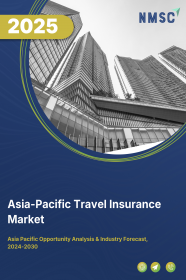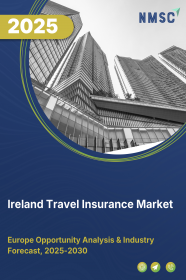
Asia-Pacific Travel Insurance Market by Age (Millennials, Generation X, and Baby Boomers), by Income Level (Low-income travelers, Middle-income travelers and High-Income Travelers), by Coverage (Medical Coverage, Trip Cancellation Coverage, Baggage and Personal Belongings Coverage, Accidental Death and Dismemberment (AD&D) Coverage)– Opportunity Analysis and Industry Forecast, 2024–2030
Industry: BFSI | Publish Date: 14-Feb-2025 | No of Pages: 268 | No. of Tables: 163 | No. of Figures: 128 | Format: PDF | Report Code : BF1977
US Tariff Impact on Asia-Pacific Travel Insurance Market
Trump Tariffs Are Reshaping Global Business
Market Overview
The Asia Pacific Travel Insurance Market size was valued at USD 5.49 billion in 2023 and is predicted to reach USD 23.95 billion by 2030, with a CAGR of 22.0 % from 2024 to 2030. Travel insurance serves as a specialized insurance product aimed at providing protection and coverage to travelers against a wide array of potential risks and unforeseen circumstances that may occur before or during their journeys. It plays a vital role in mitigating the financial impact of various travel-related emergencies, disruptions, and inconveniences, thereby ensuring that travelers can embark on their trips with confidence.
One of its key advantages is its ability to offer financial reimbursement and assistance in the event of trip cancellations or interruptions. This coverage extends to unforeseen circumstances such as illness, injury, or emergencies, allowing travelers to recover non-refundable expenses incurred for flights, accommodations, and other pre-paid arrangements.
Evolving Travel Landscape Boost the Asia Pacific Market Growth
The travel industry in the region is constantly evolving as consumer preferences, travel habits, and global trends shift over time. This evolution is evident in the emergence of new destinations and innovative travel styles tailored to diverse interests and preferences. As travelers increasingly seek unique experiences and venture off the beaten path, they encounter a spectrum of new risks and challenges, from medical emergencies in remote locales to cancellations stemming from unforeseen circumstances. In response to these changing needs, travel insurance providers are adapting and crafting new insurance plans tailored to meet the specific requirements of modern travelers.
These providers may introduce specialized coverage for adventure activities, extended travel periods, or the lifestyle of digital nomads. By offering insurance options that resonate with emerging travel trends and destinations, insurers attract a broader clientele and extend their market presence. This proactive approach not only addresses the evolving demands of travelers but also fuels market expansion by furnishing comprehensive solutions that afford peace of mind and protection across a myriad of travel experiences. Ultimately, the symbiotic relationship between the evolving travel industry and innovative insurance offerings propels market growth and ensures that travelers have access to appropriate coverage for their diverse travel needs.
Rising Number of Outbound Travelers Boost the Asia Pacific Market Growth
The rising number of outbound travelers stands as a critical force propelling market expansion across various sectors of the travel industry in the region. With an increasing population embarking on trips abroad for leisure, business, or other purposes, there's a corresponding rise in demand for associated services such as accommodation, transportation, and notably, travel insurance. This surge has particularly driven the market growth of travel insurance, as travelers increasingly acknowledge the necessity for financial protection against unexpected events such as medical emergencies, trip cancellations, or lost belongings while traveling overseas. Consequently, insurance providers are experiencing a broader customer base, prompting them to offer expanded services, competitive pricing, and innovative solutions to cater to the diverse needs of outbound travelers, thus fostering further market growth.
Regulatory Challenges Hinder the Asia Pacific Market Growth
Overcoming regulatory challenges is a significant hurdle in the expansion of the travel insurance market in the region. Compliance with various regulations across different regions and countries proves complex and costly for insurance providers. Additionally, changes or uncertainties in regulations may create barriers to entry for new market players, limiting competition and innovation.
Moreover, strict regulations related to coverage terms, pricing, and claims processing can restrict insurers' ability to offer flexible and tailored products to meet the evolving needs of customers. These challenges not only increase administrative burdens but also limit opportunities for market expansion, hindering the overall growth potential of the travel insurance industry.
Integration of Blockchain Technology Creates Ample Opportunity for the Asia Pacific Market Growth
The integration of blockchain technology provides numerous opportunities for market expansion in the travel insurance sector in the region. With its enhanced security, transparency, and efficiency in data management and transactions, blockchain helps mitigate fraudulent activities and enhances trust between insurers and customers. Smart contracts, enabled by blockchain, can automate policy issuance, claims processing, and settlements, thereby streamlining operations and reducing administrative costs for insurers.
Furthermore, blockchain's decentralized nature facilitates seamless collaboration among stakeholders, including insurers, travel agencies, and healthcare providers, enabling faster and more accurate information sharing. This integration not only enhances customer experiences by providing real-time updates and personalized services but also opens up new avenues for innovative insurance products, such as parametric insurance tailored to specific travel risks. Ultimately, blockchain technology establishes a strong foundation for market growth by driving operational efficiencies, cost reductions, and fostering greater trust and collaboration across the travel insurance ecosystem.
China Holds the Dominant Share in Asia Pacific Market
China holds the dominant share in the Asia Pacific travel insurance market due to several key factors. Firstly, the sheer size of China's population and its growing middle class have led to an increase in outbound travelers, creating a significant demand for travel insurance. Additionally, the Chinese government has been promoting outbound tourism, leading to more people traveling abroad and consequently purchasing travel insurance for protection. Moreover, the rise of online platforms and digitalization has made it easier for Chinese consumers to access and purchase travel insurance policies, further fueling the market's growth.
Lastly, the competitive landscape in China's insurance industry has led to innovative product offerings and aggressive marketing strategies, attracting more consumers to opt for travel insurance. Overall, these factors contribute to China's dominance in the Asia Pacific travel insurance market.
South Korea is Expected to Show Steady Growth in the Asia Pacific Market
South Korea is expected to show steady growth in the Asia Pacific travel insurance market due to several reasons. Firstly, South Korea has a robust economy with a growing middle class and increasing disposable income, leading to more people traveling both domestically and internationally. This rising trend in travel creates a greater awareness and demand for travel insurance among South Korean travelers who seek protection against unexpected events during their trips.
Additionally, the South Korean government's efforts to promote tourism and encourage outbound travel further contribute to the expansion of the travel insurance market.
Moreover, the presence of well-established insurance companies and their innovative product offerings tailored to meet the specific needs of travelers enhances the accessibility and attractiveness of travel insurance in South Korea. Overall, these factors combine to support the expected steady growth of the travel insurance market in South Korea within the Asia Pacific region.
Competitive Landscape
Several market players operating in the Asia-Pacific travel insurance market include Allianz Group, AXA SA, Zurich Insurance Group Limited, American International Group, Inc., Chubb Limited, Aviva PLC, Nationwide, Berkshire Hathaway Speciality Insurance, Travel Insured International, Generali Group and Others.
Asia-Pacific Travel Insurance Market Key Segments
By Age
-
Millennials
-
Generation X
-
Baby Boomers
By Income Level
-
Low-income Travelers
-
Middle-income Travelers
-
High-income Travelers
By Coverage
-
Medical Coverage
-
Trip Cancellation Coverage
-
Baggage and Personal Belongings Coverage
-
Accidental Death and Dismemberment (AD&D) Coverage
By Days of Coverage
-
Short-Trip Insurance
-
Standard Trip Insurance
-
Extended Trip Insurance
-
Multi-Trip Insurance
By End User
-
Pilgrim Travelers
-
Education Travelers
-
Business Travelers
-
Family Travelers
By Distributional Channel
-
Insurance Companies
-
Banks
-
Airlines
-
Online Platforms
-
Insurance Aggregators and Comparison Websites
-
Travel Agents and Tour Operators
By Country
-
China
-
Japan
-
India
-
South Korea
-
Australia
-
Indonesia
-
Singapore
-
Taiwan
-
Thailand
-
Hong Kong
-
GBA (excluding Hongkong)
-
Rest of Asia-Pacific
REPORT SCOPE AND SEGMENTATION:
|
Parameters |
Details |
|
Market Size in 2023 |
USD 5.49 Billion |
|
Revenue Forecast in 2030 |
USD 23.95 Billion |
|
Growth Rate |
CAGR of 22.0 % from 2024 to 2030 |
|
Analysis Period |
2023–2030 |
|
Base Year Considered |
2023 |
|
Forecast Period |
2024–2030 |
|
Market Size Estimation |
Billion (USD) |
|
Growth Factors |
|
|
Countries Covered |
12 |
|
Companies Profiled |
10 |
|
Market Share |
Available for 10 companies |
|
Customization Scope |
Free customization (equivalent up to 80 working hours of analysts) after purchase. Addition or alteration to region, regional, and segment scope. |
|
Pricing and Purchase Options |
Avail customized purchase options to meet your exact research needs. |
KEY PLAYERS
-
Allianz Group
-
AXA SA
-
Zurich Insurance Group Limited
-
American International Group, Inc.
-
Chubb Limited
-
Aviva PLC
-
Nationwide
-
Berkshire Hathaway Speciality Insurance
-
Travel Insured International
-
Generali Group

















 Speak to Our Analyst
Speak to Our Analyst





















